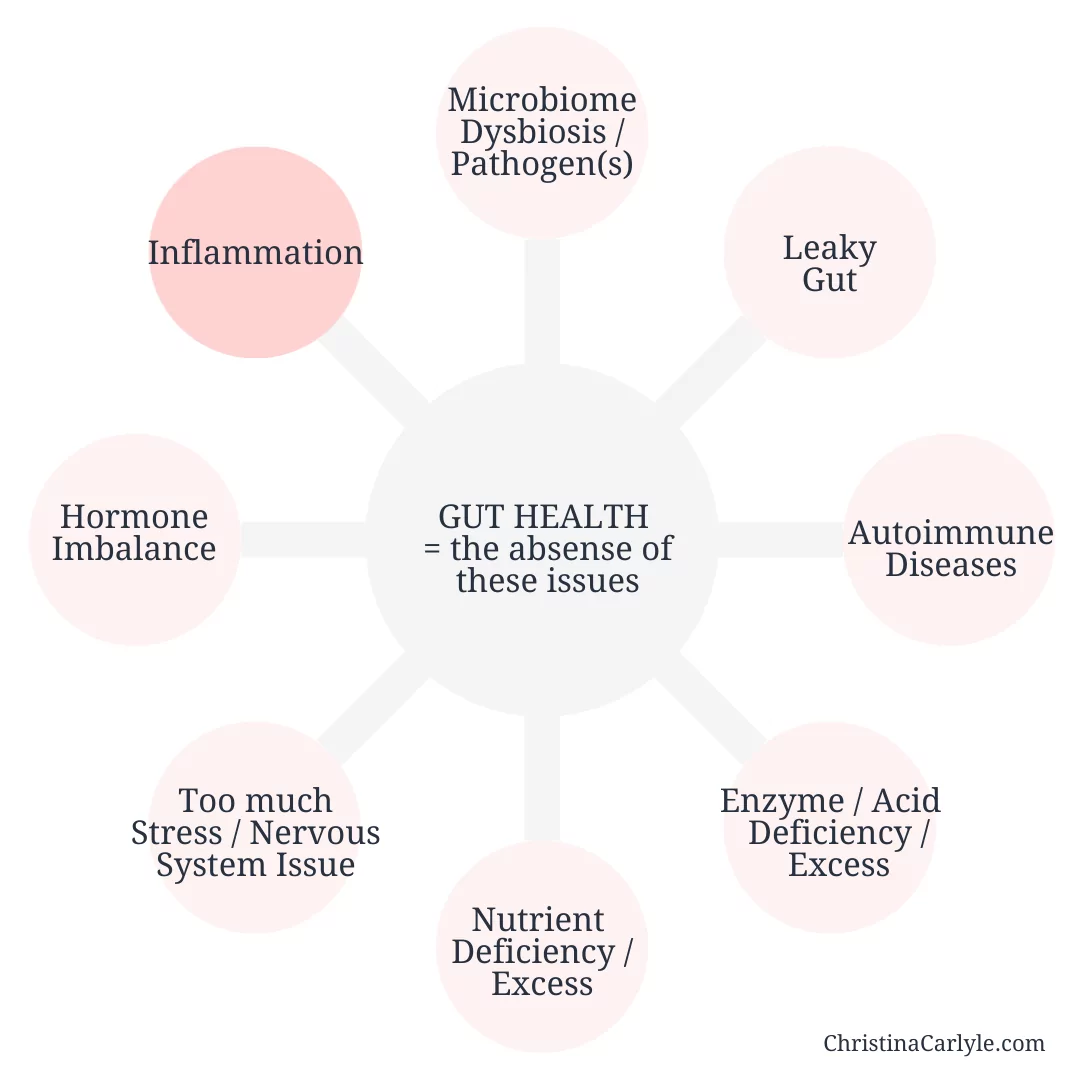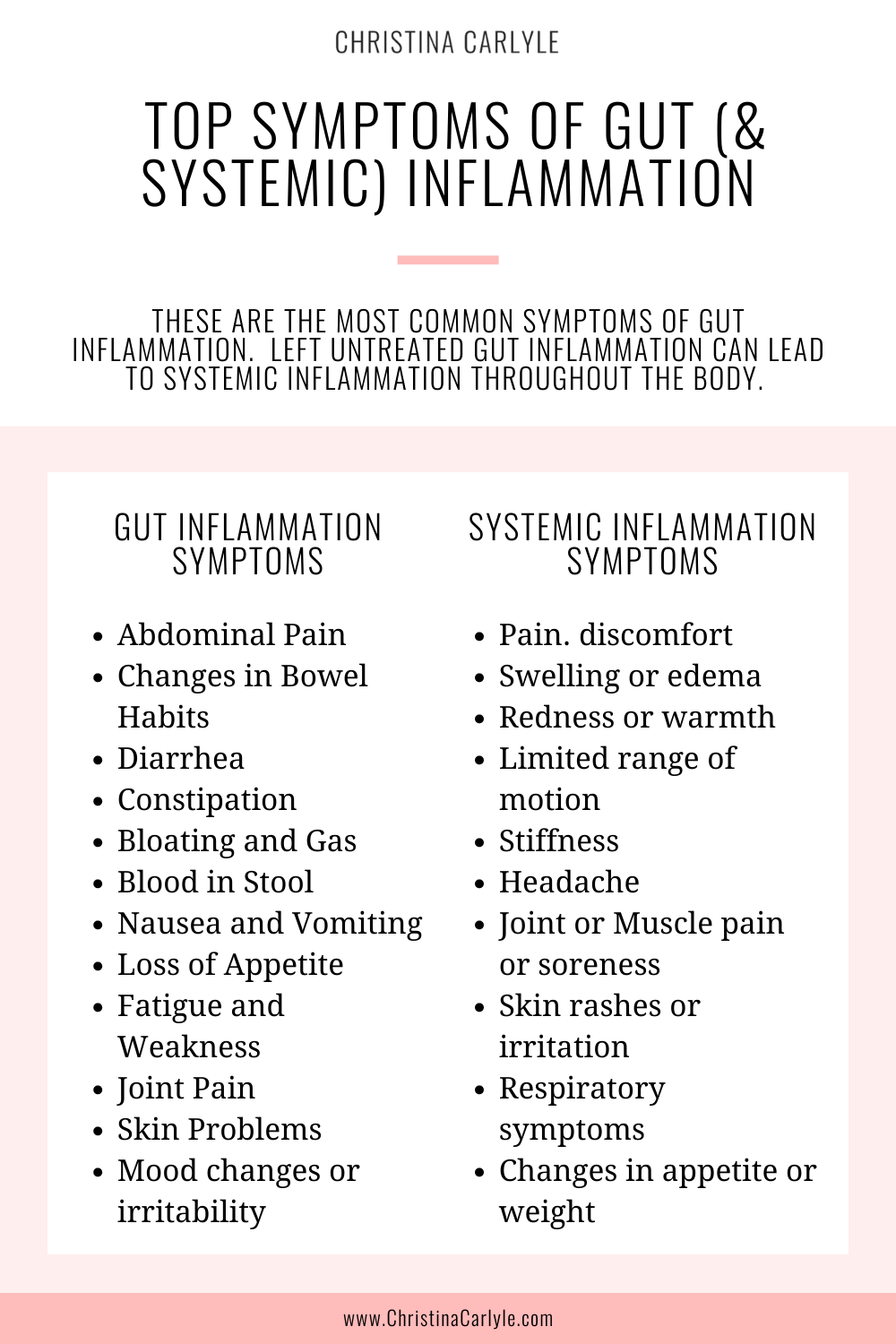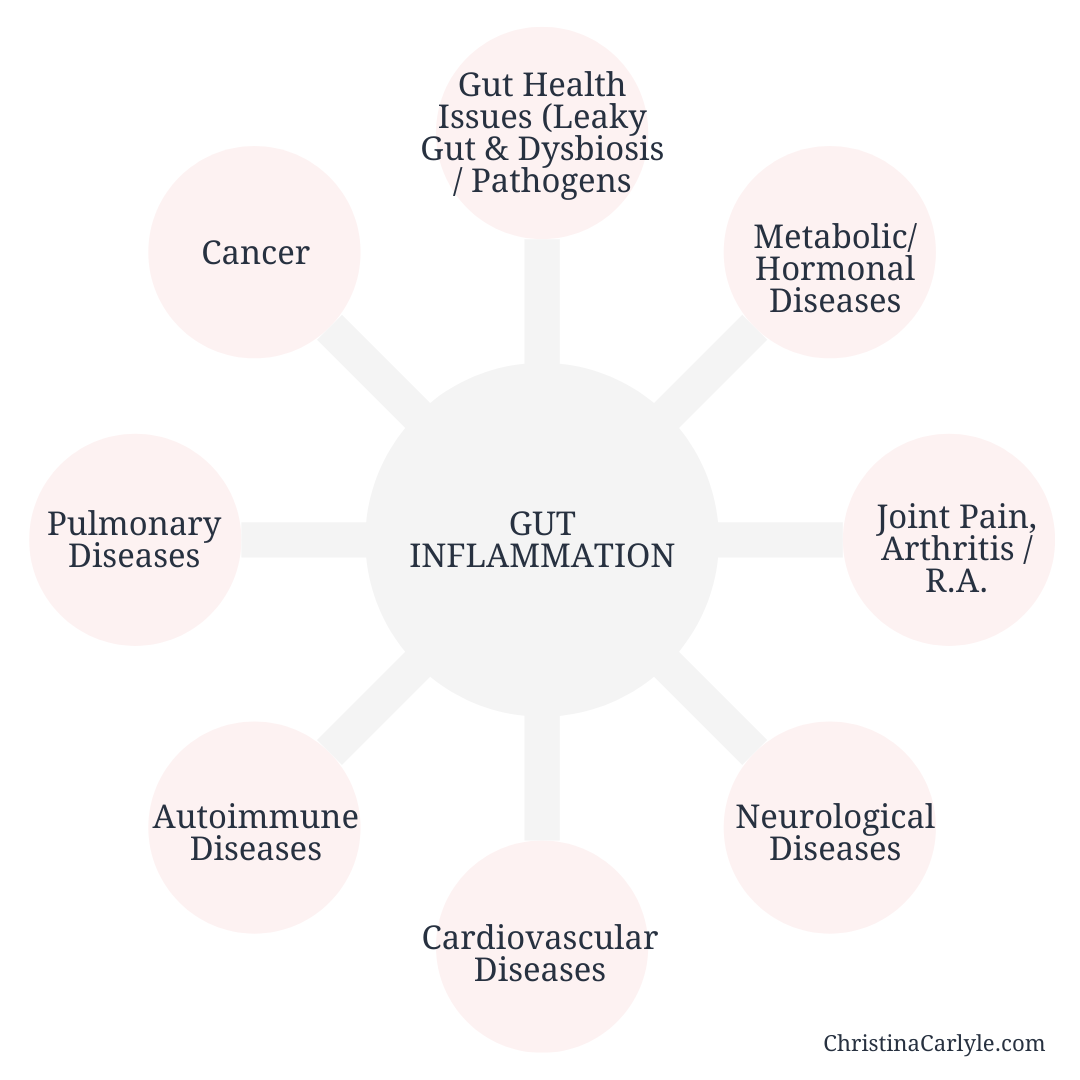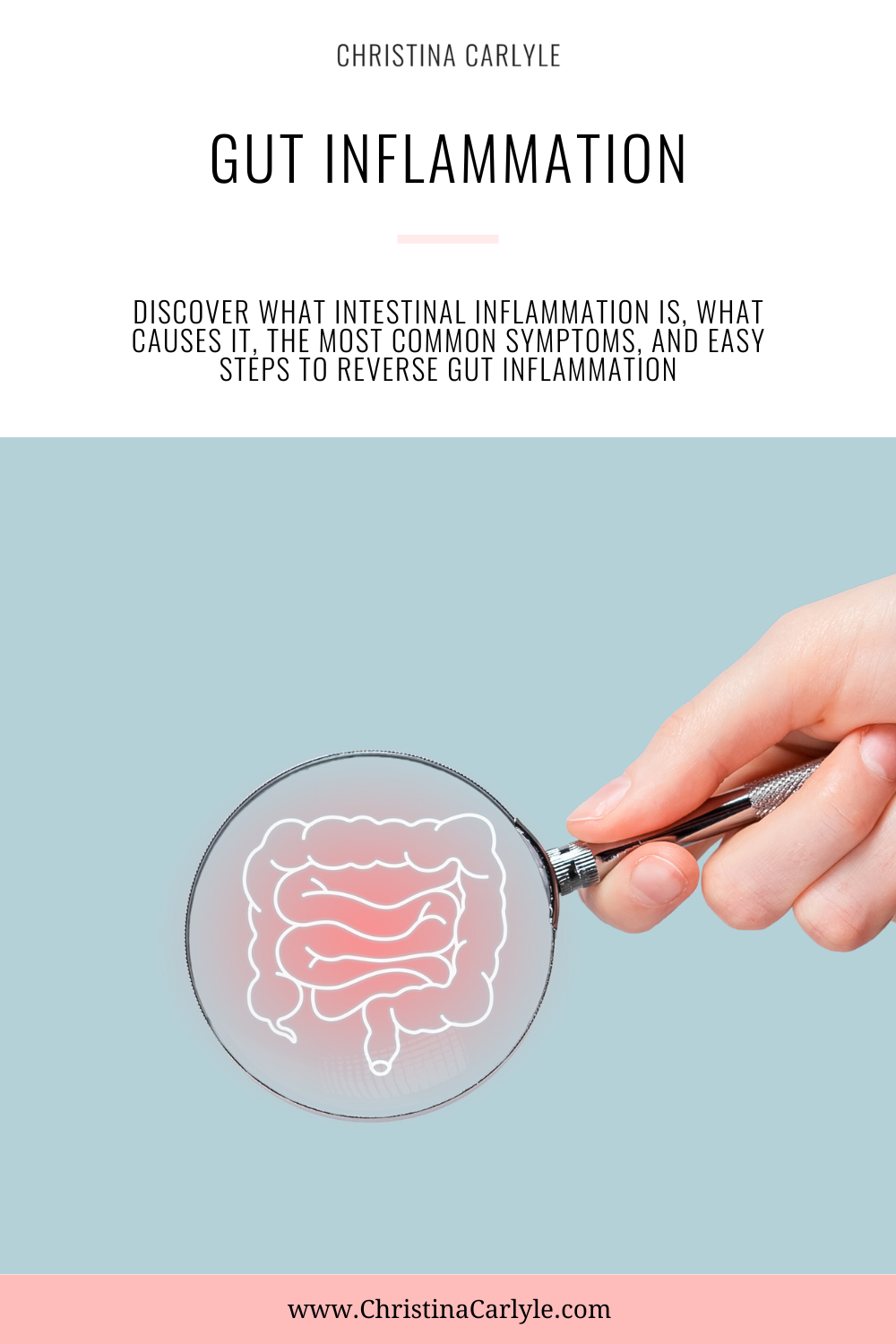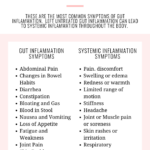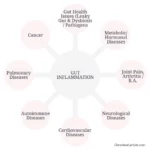Last Updated on June 29, 2023
Intestinal inflammation is often the root cause of so many of my client’s struggles with weight loss and wellness.
Most people I work with have no idea just how inflamed their gut really is, why gut inflammation is a huge red flag, what causes it, and how to reverse inflammation quickly.
That’s why I’ve created this Guide to Gut Inflammation.
You’ll learn:
- What intestinal inflammation is?
- What Causes GI Inflammation?
- The Most Inflammatory Foods
- Gut Inflammation Symptoms
- How Inflammation Affects Health And Weight?
- Simple Steps to Reverse Inflammation and Heal and Balance the Gut
Let’s dig in!
We’ve already discussed that gut health is defined as the absence of all issues that contribute to gut health. Gut inflammation itself can affect your health. But left untreated inflammation can quickly snowball and cause other gut issues and health concerns throughout the rest of the body.
What is Intestinal Inflammation?
Intestinal inflammation, also referred to as enteritis, is a condition characterized by the inflammation of the gastrointestinal tract. It primarily affects the small intestine and/or the large intestine (colon), although it can involve other parts of the digestive system as well.
Intestinal inflammation can be acute, short-term, chronic, or long-lasting.
The type of severity of inflammation typically depends on the root cause of the inflammation. Generally speaking, the more causes there are, the worst the symptoms and inflammation will become.
What Causes Gut Inflammation?
Gut inflammation, also known as gastrointestinal inflammation, can be caused by various factors, namely by eating inflammatory foods, engaging in inflammatory behaviors, and other sometimes unavoidable/genetic factors.
Let’s start with the diet.
Inflammatory Foods (aka the worst foods for gut health)
In addition to the causes mentioned earlier, certain dietary factors can contribute to gut inflammation. Here are some examples of inflammatory foods that may exacerbate gut inflammation:
- High-sugar foods: Consuming excessive amounts of sugar, particularly refined sugars and high-fructose corn syrup, can promote inflammation in the gut. This includes sugary beverages, candies, pastries, and processed snacks.
- Refined grains: Refined grains like white flour, white rice, and processed cereals have been stripped of their fiber and nutrients, leading to a rapid spike in blood sugar levels and increased inflammation.
- Trans fats: Foods containing trans fats, such as fried foods, margarine, and commercially baked goods, can trigger inflammation in the body, including the gut.
- Processed meats: Processed meats like sausages, hot dogs, and deli meats often contain additives, preservatives, and high levels of sodium, which can contribute to inflammation.
- Vegetable oils: Certain vegetable oils, including soybean oil, corn oil, and sunflower oil, are high in omega-6 fatty acids. Consuming an imbalanced ratio of omega-6 to omega-3 fatty acids (found in fatty fish, walnuts, flaxseeds, etc.) can promote inflammation.
- Artificial additives: Artificial additives like artificial sweeteners, food colorings, and preservatives may trigger gut inflammation in some individuals. It’s best to limit the consumption of processed foods that contain these additives.
- Alcohol: Excessive alcohol consumption can irritate the gut lining and contribute to inflammation. It can also disrupt the balance of gut bacteria.
Some common causes of gut inflammation that aren’t related to the diet are:
- Infections: Bacterial, viral, or parasitic infections can lead to gut inflammation. Examples include gastroenteritis caused by pathogens like Salmonella, Campylobacter, or norovirus.
- Inflammatory bowel diseases (IBDs): Although the exact cause of IBS is unknown, it is believed to involve a combination of factors, including altered gut motility, visceral hypersensitivity, and low-grade inflammation. Conditions like Crohn’s disease and ulcerative colitis are chronic inflammatory disorders that primarily affect the gastrointestinal tract, leading to persistent gut inflammation.
- Food allergies and intolerances: Some individuals may experience gut inflammation due to allergic reactions or intolerances to certain foods. Common culprits include gluten (celiac disease), lactose (lactose intolerance), or specific food proteins.
- Autoimmune reactions: In autoimmune diseases like celiac disease or autoimmune hepatitis, the immune system mistakenly attacks the body’s own tissues, including the gut, leading to inflammation.
- Stress and psychological factors: High levels of stress, anxiety, or psychological disorders can affect gut health. The gut has a complex connection to the brain, known as the gut-brain axis, and emotional stress can trigger inflammation in the gastrointestinal system.
- Medications: Some medications, such as nonsteroidal anti-inflammatory drugs (NSAIDs) like ibuprofen, can irritate the lining of the stomach and cause inflammation, leading to conditions like gastritis.
- Environmental factors: Exposure to environmental toxins, pollutants, or certain chemicals can contribute to gut inflammation.
It’s important to note that these causes can often interact with each other, and the development of gut inflammation can be influenced by a combination of factors.
If these inflammatory foods or issues are affecting your gut you’ll experience symptoms.
Do you have any symptoms of gut inflammation?
Symptoms of an Inflamed Gut
The symptoms of intestinal inflammation can vary depending on the underlying cause and the specific location and severity of the inflammation. However, there are several common symptoms that are often associated with intestinal inflammation. These include:
- Abdominal pain: Persistent or recurring abdominal pain is a common symptom of gut inflammation. It may be localized or spread throughout the abdomen.
- Changes in bowel habits: Intestinal inflammation can cause alterations in bowel habits, including changes in stool frequency and consistency. This can manifest as alternating episodes of diarrhea and constipation.
- Diarrhea: Increased frequency and loose consistency of bowel movements are often observed in gut inflammation. Diarrhea may be accompanied by urgency and a sense of incomplete bowel emptying.
- Constipation: In some cases, gut inflammation can lead to difficulty passing stools or infrequent bowel movements.
- Bloating and gas: Excessive gas production and bloating can occur due to altered gut motility and impaired digestion.
- Blood in the stool: Inflammatory conditions like Crohn’s disease or ulcerative colitis can cause bleeding in the digestive tract, leading to blood in the stool.
- Nausea and vomiting: Gut inflammation can cause feelings of nausea and, in some cases, may lead to vomiting.
- Loss of appetite: Inflammation in the gut can reduce appetite and contribute to unintentional weight loss.
- Fatigue and weakness: Intestinal inflammation can cause systemic effects, leading to fatigue and a general feeling of low energy. This can be related to the body’s immune response and the impact of inflammation on overall well-being.
- Joint pain: In certain inflammatory bowel diseases, such as Crohn’s disease or ulcerative colitis, joint pain, and swelling may be present.
- Skin problems: Some individuals with gut inflammation may experience skin issues like rashes, eczema, or ulcers.
- Mood disturbances: Gut inflammation can impact mental well-being and may be associated with symptoms of anxiety and depression. This can be due to the connection between the gut and the brain, known as the gut-brain axis.
The symptoms of intestinal inflammation can vary depending on the underlying cause and location of inflammation.
Common symptoms may include abdominal pain, cramping, diarrhea, rectal bleeding, weight loss, fatigue, and changes in bowel habits.
In more severe cases, complications such as strictures (narrowing of the intestine), fistulas (abnormal connections between different parts of the intestine or between the intestine and other organs), and abscesses may develop. Left untreated inflammation can migrate to other areas of the body.
It’s important to diagnose and treat intestinal inflammation appropriately, as chronic inflammation can lead to complications and long-term damage to the intestines. If you suspect you have intestinal inflammation or are experiencing persistent gastrointestinal symptoms, I recommend seeking medical advice for proper evaluation and diagnosis.
Until then let’s go over the root causes of inflammation. If you have symptoms and root causes there’s a huge chance you have intestinal inflammation. If so you want to address it before it begins to affect your health and weight.
How Inflammation Affects Health and Weight?
When inflammation in the gut is left untreated, it can have systemic effects on the body and contribute to inflammation in other parts of the body.
Here’s how untreated gut inflammation can lead to inflammation throughout the body and potentially manifest in various diseases or diagnoses:
- Increased intestinal permeability/pathogens: Inflammation in the gut can disrupt the integrity of the intestinal lining and cause dysbiosis, leading to a leaky gut and pathogens. This allows substances like bacteria, toxins, pathogens, and undigested food particles to leak through the intestinal barrier and enter the bloodstream.
- Systemic inflammation: When these substances leak into the bloodstream, they can trigger an immune response and lead to systemic inflammation throughout the body. The immune system reacts to these foreign substances by releasing inflammatory molecules, such as cytokines, which can contribute to widespread inflammation.
- Impact on other organs and systems: Systemic inflammation originating from the gut can affect various organs and systems. For example, it can contribute to joint inflammation and joint pain, leading to conditions like rheumatoid arthritis. It can also affect the cardiovascular system, leading to an increased risk of heart disease, and impact the liver, contributing to liver inflammation or non-alcoholic fatty liver disease.
- Autoimmune reactions: Chronic gut inflammation can also trigger autoimmune responses in susceptible individuals. The immune system, in an attempt to target the perceived threats from the leaky gut, may start attacking healthy tissues in other parts of the body. This can result in autoimmune diseases such as lupus, multiple sclerosis, or celiac disease.
- Metabolic dysfunction: Untreated gut inflammation and systemic inflammation can also impact metabolic health. It can contribute to insulin resistance, a key feature of type 2 diabetes, and disrupt hormone regulation, leading to imbalances that can manifest as metabolic disorders. All hormone issues can cause metabolic dysfunction that can have an impact on your weight.
- Increased disease risk: Prolonged inflammation throughout the body can increase the risk of developing diseases. While this is not an exhaustive list, it provides an overview of some common diseases that can be caused or influenced by inflammation. These include rheumatoid arthritis, inflammatory bowel diseases (such as Crohn’s disease and ulcerative colitis), asthma, cardiovascular diseases (such as atherosclerosis and heart disease), psoriasis, diabetes (particularly type 2 diabetes), autoimmune hepatitis, chronic obstructive pulmonary disease (COPD), periodontal disease, and certain neurodegenerative diseases (such as Alzheimer’s disease and Parkinson’s disease).
- Cancer: Chronic inflammation can increase the risk of certain cancers and contribute to metabolic disorders. It’s important to recognize that the relationship between inflammation and these diseases can be complex, and multiple factors are involved in their development and progression. Seeking proper medical diagnosis and appropriate management are essential for addressing inflammation-related diseases effectively.
- Adipose tissue dysfunction: Inflammation can affect adipose tissue (fat cells) and disrupt their normal function. Inflammatory molecules released during chronic inflammation can interfere with the balance of hormones involved in appetite regulation, such as leptin and ghrelin. This disruption can lead to increased hunger and overeating, potentially resulting in weight gain.
- Metabolic syndrome: Inflammation is closely associated with metabolic syndrome, a cluster of conditions that includes high blood pressure, high blood sugar levels, excess body fat around the waist, and abnormal cholesterol levels. Metabolic syndrome increases the risk of weight gain and obesity.
- Psychological factors: Inflammation can affect mood and mental well-being. Chronic inflammation has been associated with symptoms of depression and anxiety, which can influence eating behaviors and contribute to weight gain or difficulty in managing weight.
It’s important to note that the progression from untreated gut inflammation to the development of specific diseases can vary between individuals. Not everyone with gut inflammation will develop the same complications or diseases. The severity of the inflammation, genetic factors, lifestyle factors, bioindividuality, and overall health status all contribute to the manifestation of diseases or diagnoses.
If you have gut inflammation symptoms, follow these steps to reverse inflammation and heal and balance the gut.
Steps To Balance and Heal the Gut & Microbiome
To begin healing the gut removing all sources of inflammation is a must!
So it’s best to start by radially reducing root causes of inflammation so your GI tract can start healing itself.
Follow these steps to reduce inflammation. This simple protocol also boosts gut health and metabolism so you can reverse symptoms and lose weight:
- Cut out all inflammatory sources of foods, drinks, supplements, and consumables & eat a diet that promotes gut health and healing. You can’t heal the gut simply by eating healthy… you have to avoid the wrong things and eat the right things to heal the gut and reverse inflammation, microbiome, hormone, toxicity, metabolic, and nutrient absorption issues. That’s what my Total Transformation Program does and why it works so well (& quickly!)
- Heal and balance your gut with these Gut Health Supplements.
- Eat high Probiotic and Prebiotic foods with every meal. (at least one serving of both pre/pro per meal.)
- Eat Gut Healing Foods. These have the nutrients, fibers, and plant chemicals needed to heal and balance all aspects of the gut. Eat 1-2 servings of these Gut Healing Foods with every meal.
- Engage in a healthy lifestyle & other healthy habits that support gut health and metabolism (like stress management, hydration, exercise, supplementation, etc. – all of which are covered in my Total Transformation Program.)
- Radically reduce stressors in your life and use healthy coping skills.
- When you combine the right diet + healing protocols & supplements you’ll get results you can see and feel a LOT faster.
If you really want to clean up your diet, heal your gut, reverse inflammation, balance hormones, and get rid of fatigue and cravings – AND lose weight – you need my Total Transformation Program.

4 week before and afters using my Total Transformation Program
When you combine the right diet + healing protocols & supplements you’ll get results you can see and feel a LOT faster.
Remember, if you have gut health symptoms you most likely also have metabolic dysfunction. This free training explains more about metabolic dysfunction & how I fix it so you can lose weight & feel great ASAP.
I hope this helped you! If you need any help healing your gut feel free to reach out. I’m happy to point you in the right direction.
Your Coach & Biggest Cheerleader,
![]()
MORE GUT HEALTH & WEIGHT LOSS INFO
Check out these related articles to fill in more of the “gut health puzzle” so you’ll understand more about the different aspects of gut health, how they cause symptoms & weight gain, and how to optimize your gut health to maximize your weight loss potential:
- Gut Health and Weight Loss
- What are Probiotics?
- Probiotics and Weight Loss
- What are Prebiotics?
- The Best Foods for Gut Health
- What is Leaky Gut?
- Gut Health Supplements
- Intestinal Inflammation
- Gut Microbiome
Remember, if you have gut health symptoms you most likely also have metabolic dysfunction. This free training explains more about metabolic dysfunction & how I fix it so you can lose weight & feel great ASAP.


